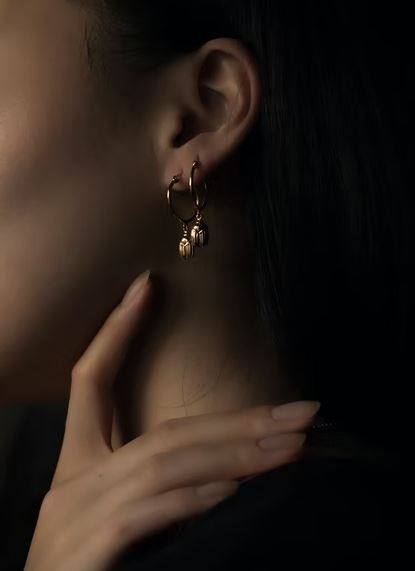When it comes to finishing touches, selecting the ideal earrings for sensitive ears can make all the difference. When it comes to accessories, however, some people avoid the hassle of earrings entirely. It is understandable: Have you ever gone shopping for the perfect pair of earrings only to have them turn your lobes into an itchy, red, swollen mess? Zero fun. And jewelry is frequently to blame.
If you have sensitive skin, you should look for products that will not harm or irritate your skin. If your earlobes are already red, itchy, sore, or bleeding, the last thing you want to do is aggravate them. All of these are signs of severe jewelry allergies.
If you cannot wear regular earrings because you are allergic to nickel, you are probably allergic to nickel. Nickel is a component of the metal used in today’s jewelry.
Hypoallergenic jewelry is a viable alternative. Hypoallergenic earrings are gentle on your sensitive ears while also adding sparkle.
However, you should go one step further in looking for the right earrings and buy nickel-free earrings.
The Hypoallergenic Earrings
To begin, keep in mind that hypoallergenic earrings are not always safe to wear by you or your child. When earrings are hypoallergenic, they are less likely to cause allergic reactions. It does not make them disappear.
Even with these earrings, your skin may still be irritated. This is because naming a product hypoallergenic does not imply that it meets any specific criteria. The Metal-Containing Jewelry Law in California, for example, only prohibits the use of cadmium and lead in jewelry, not a nickel.
Nickel use in jewelry is strictly regulated only in the European Union. These standards do not apply to jewelry imported to and sold in North America.
It is Vital to Wear Nickel-Free Jewelry
Most hypoallergenic earrings may not have nickel on the surface of their posts, but they may have nickel under the coating, which your skin comes into contact with if it scratches or wears off. One tip for wearing jewelry with sensitive skin is to avoid wearing nickel jewelry. Most bargain or fake jewelry looks cute when it is new, but their finishes are usually thin and scrape off easily, revealing the nickel underneath. That is when your ears develop those allergic symptoms.
Other Types of Metal Allergies
Other metal reactions are possible, but not as popular as nickel reactions. Copper allergies are extremely uncommon. Metals like chromium and cobalt are also used in jewelry and can cause a rare allergy, but they’re more likely to be exposed to them on a job site from materials like cement than from jewelry. So when we say a necklace or pair of earrings is hypoallergenic, we’re talking about low or no nickel.
The Best Hypoallergenic Metals
The Rhodium
Perhaps one of our favorite hypoallergenic metals is rhodium. Rhodium jewelry is typically sterling silver with rhodium plating. Rhodium is a lustrous, high-grade metal that is nickel-free. Rhodium plating can be done on any metal, but the best hypoallergenic option is nickel-free sterling silver. Rhodium plating will protect against a nickel reaction regardless of the base metal. However, the plating will wear out over time and will need to be replaced, so make sure the metal beneath the rhodium is also hypoallergenic.
The Sterling Silver
The majority of sterling silver jewelry is hypoallergenic. Sterling silver is a mixture of primarily silver and other metals that add toughness to pure silver. Some sterling silver is nickel-free, while other sterling silver is not. Although nickel is present in sterling silver, most people are unconcerned about the small percentage. Because of its copper content, legit sterling silver will tarnish, but this can be avoided with regular cleaning and use.
The Platinum
Platinum is a hypoallergenic metal that is also the most expensive. Nickel does not cut when platinum is blended with other metals for jewelry. Platinum alloys are commonly made from ruthenium, iridium, and cobalt, and all three metals are hypoallergenic.
The Gold
Although 24k gold is hypoallergenic, it is too soft to be used in jewelry. Gold is strengthened by the addition of other metals. Both 14k and 18k gold are alloys, with 18k containing a higher percentage of pure gold. Because 14k gold contains only a small amount of nickel, based on how delicate your skin is to nickel, you may be able to wear it without causing a reaction. If it still irritates your skin, try 18k, and if that doesn’t work, try 24k or another type of hypoallergenic metal. One hypoallergenic gold option is rose gold. It’s made up of a mixture of pure gold and copper, and neither metal is known to cause allergic reactions.
The Vermeil
Vermeil is 18k gold-plated sterling silver. Because the gold still contains nickel, it is not hypoallergenic, but it is an excellent pick for sensitive skin. The sterling silver is hypoallergenic, and the 18k gold contains very little nickel.
The Titanium
Titanium is hypoallergenic because it is made up of aluminum and vanadium rather than nickel. Titanium is also resistant to corrosion and can be worn in the ocean or pool. It’s light and strong, so strong that resizing it can be difficult.
The Copper
Unless reinforced with nickel, copper is generally hypoallergenic. Copper allergies do exist, but they are extremely uncommon. Brass, which is made up of copper and zinc, is hypoallergenic. Copper and brass, on the other hand, are both low-cost materials with a short lifespan. Both copper and brass cause skin to turn green. This symptom is not caused by an allergic reaction. The green color is caused by oxidation, which occurs when the copper reacts with sweat or chemicals. It’s not pretty, but it’s completely safe for your skin.
What should you do if you are allergic to earrings or any other type of jewelry?
1. Consult with a dermatologist.
This is a significant first step in identifying whether you have a nickel allergy or if your skin irritation is caused by something else. You can also experiment with different recipes to help and soothe your sensitive skin.
2. Wearing costume jewelry is not recommended.
Nickel is used frequently in costume jewelry. If you are allergic to nickel, it is worth investing in pieces that will not irritate your skin and will last a long time.
3. When purchasing jewelry, avoid nickel.
Wearing nickel-containing jewelry will never be enjoyable if your skin is nickel-sensitive, no matter how sensitive it is.

